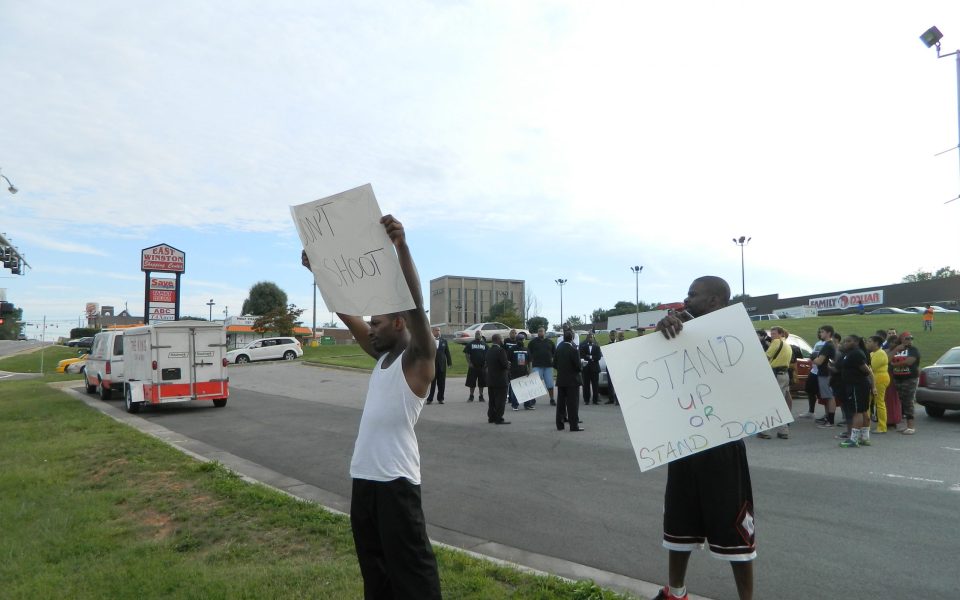by Jordan Green
Reacting to events in Ferguson, young, black men in Winston-Salem say they feel harassed and profiled by the police.
Young, black men on the east side of Winston-Salem find it easy to relate to the experience of Michael Brown, the teenager shot and killed by a police officer in Ferguson, Mo. earlier this month.
Mike Hannah and Reginald Kelley, clad in white undershirts and black pants, stood on the side of Martin Luther King Jr. Drive and chanted, “Hands up, don’t shoot,” urging passing motorists to join a protest against police violence on Aug. 22. The rally was organized in a couple days by activists Artemus “Poppa” Peterson and Mike Pegues, along with community organizer Nakida McDaniel, among others.
“It’s innocent lives that are being taken,” Peterson told a crowd of about 60 people. “Really, what Mr. Brown had to endure was uncalled for.”
The rally drew a diverse crowd that included young families, members of the Nation of Islam and students from Reynolds High School, Forsyth Tech and Wake Forest University. Lining Martin Luther King Jr. Drive near the intersection of New Walkertown Road, they chanted, “We’re all Michael Brown” and “Put your guns down and your peace signs up.” They flashed peace signs, modifying the “hands up” posture displayed by demonstrators in Ferguson over the past two weeks.
Hannah and Kelley emphasized that the purpose of the rally was not to divide people by race.
“It could be anybody’s child,” Kelley said.
He added, “The average person can do time for a crime, and the officer should do the same.”
Hannah and Kelley said as young, black men, they’re tired of being profiled and harassed by the police. They said they were recently pulled over without cause in a traffic stop by a couple Winston-Salem police detectives.
“They said we looked like we were doing wrong,” Kelley said.
Hannah added, “That was our neighborhood. Y’all target us. How do we look like we’re trespassing in our own neighborhood?”
Kelley said he feels that the police view all people in black communities as drug dealers, and while some people have run afoul of the law, they shouldn’t be continually harassed after they learn their lessons and are only trying to run errands and take care of their families. They added that the police keep track of everyone they’ve encountered, and they use that information to justify additional stops, hoping to find something to make a charge.
“They say they stopped you before and they’ll use that against you, even if you never been convicted,” Kelley said. “Every time you want to pull me over just because you smelled marijuana in the car before?”
The Winston-Salem police maintained a minimal presence at the Aug. 22 protest, with a patrol car parked in a lot across the street to monitor the event.
But Eric Pegues, a party organizer who helped arrange the protest, said he thought the number of police cruising past the gathering was excessive. A police officer approached him to request that a car in the adjacent Farmers & Mechanics Bank parking lot be moved. The bank was closed for the day and the parking lot was virtually empty, but Pegues said the officer told him the police had received a complaint about it. Pegues quietly obliged the officer’s request, but later expressed frustration, saying he thought the complaint was a bogus pretext to harass the protesters.
Like Hannah and Kelley, Pegues said it’s common for the Winston-Salem police to pull over young, black men without cause, and he said he witnessed a recent incident.
“The ‘jump-out guys,’ that’s what we call them on the street — I think they’re the gang unit — they pulled over three African-American males,” Pegues said. “It turns out the kids were going to Winston-Salem State University. Why did you pull them over? They said, ‘We saw you pull out of the parking lot.’ It was this shopping center right over here. They pulled them out of the car and had the drug dog sniffing it. Everybody who saw that thinks they must have been doing something wrong even though they weren’t.
“We get the most speeding tickets,” added Pegues, who is black. “It’s like they sit and wait for us. You don’t have to be doing anything wrong.”
Assistant Chief Connie Southern referred questions about police-community relations to Assistant Chief Wilson Weaver. Neither Weaver nor Chief Barry Rountree could be reached in time for this story.
Peterson said a meeting will be held at Carl Russell Recreation Center on Wednesday to discuss further steps to curb police abuses in Winston-Salem.
“One of your kids got to get killed for you to do something?” Peterson said during the protest. “Tomorrow ain’t promised, and the way they’re shooting it definitely ain’t promised. If it’s the police that are shooting we got to go to the authorities and say, ‘Why are you sending a thousand police officers over to the east side, when they’re ain’t even that many people over here?”
Join the First Amendment Society, a membership that goes directly to funding TCB‘s newsroom.
We believe that reporting can save the world.
The TCB First Amendment Society recognizes the vital role of a free, unfettered press with a bundling of local experiences designed to build community, and unique engagements with our newsroom that will help you understand, and shape, local journalism’s critical role in uplifting the people in our cities.
All revenue goes directly into the newsroom as reporters’ salaries and freelance commissions.





Leave a Reply